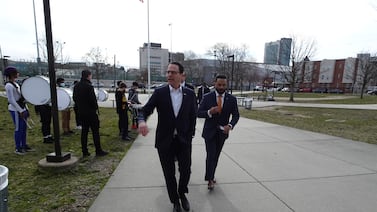The Aurora school district says it will replace state-rejected reading curriculum at nine schools over the next two years in an effort to comply with a 2019 state law that requires reading programs backed by science.
The move represents a major shift for the 38,000-student suburban district, where leaders have argued repeatedly, including last spring, that the state’s curriculum rules didn’t apply to them.
Aurora officials were slow to divulge their plan to replace unacceptable K-3 curriculum when asked by Chalkbeat about the issue starting in November. They didn’t answer emails, issued a vague statement about the district’s literacy efforts, and otherwise sidestepped questions.
State officials also didn’t know about the district’s plans until recently. State officials said Thursday that Aurora officials told them they sent the state a letter in September with the district’s curriculum replacement plan. It never arrived and apparently got lost in the mail, said Floyd Cobb, executive director of teaching and learning at the Colorado Department of Education.
The coming changes in Aurora, and the confusion and resistance that prefaced them, spotlight the sometimes rocky road the state faces in its bid to get more Colorado children reading on grade level.
The Boulder Valley district also recently pushed back against the state’s curriculum rules and Durango district leaders expressed surprise after receiving a state letter flagging their use of state-rejected programs. In a local control state where schools have long been allowed to choose any reading curriculum or none at all, the new guardrails on curriculum are unprecedented and unfamiliar.
In Aurora, where more than three-quarters of third graders struggle to read and many students are English learners, the stakes couldn’t be higher. Improving early literacy rates is one of the school board’s top priorities, but board members have not specifically discussed adopting new reading curriculum during recent public discussions on the topic.
In contrast, several other big metro districts, including Denver, Jeffco, Douglas County, and Cherry Creek, have publicized plans to adopt new elementary reading programs that comply with state rules.
Experts say well-trained teachers are the most critical ingredient for good reading instruction, but that high-quality curriculum makes that job easier, especially for new teachers.
Currently, it’s hard for parents and the public to figure out what programs schools use to teach young children how to read. A 2021 transparency law is set to make that easier, but not till sometime next year.
Discredited curriculum
Last January, when Chalkbeat first asked Aurora what reading curriculums were used in kindergarten through third grade at every school, the district said that about two-thirds of elementary and K-8 schools used a state-approved curriculum called Wonders.
Roughly another third — 11 schools enrolling about 5,000 students — used two state-rejected curriculums: Units of Study for Teaching Reading, commonly called Lucy Calkins, and Fountas & Pinnell Phonics.
Both programs received failing marks from state reviewers in 2020, a ruling that meant schools would eventually have to replace them or potentially face state sanctions. Lucy Calkins, a widely used program nationwide, has also received low ratings from the nonprofit curriculum reviewer EdReports and been harshly criticized by reading researchers, in part for encouraging students to guess at words instead of sounding them out.
In October, state officials began enforcing Colorado’s curriculum rules, sending out official letters to dozens of districts ordering them to replace state-rejected reading programs. But Aurora wasn’t among them.
That’s because on the electronic form district officials submitted to the state this fall, they didn’t report using Lucy Calkins or Fountas & Pinnell Phonics at any schools. Instead, for all 11 schools, the district listed “no core published program in use.” That response didn’t trigger a state letter as state-rejected programs would have. State officials have said they’ll eventually ask follow-up questions of districts that selected that answer, likely in the new year.
Mixed messages
With Aurora conspicuously absent from the list of districts that received state letters, Chalkbeat asked district officials whether the 11 district schools that previously used the two state-rejected curriculums still used those programs.
District spokesman Corey Christiansen said by email on Nov. 22 that the district hadn’t received a letter from the state and isn’t “currently mandated to switch our reading curriculum.” After three more inquiries from Chalkbeat, and still no clear answers about the 11 schools, he said on Dec. 1 the district had no further comment.
On Dec. 2, Christiansen acknowledged that nine schools still use the two state-rejected reading curriculums. He also said the district had already submitted a plan to the state for replacing the programs, but didn’t provide it to Chalkbeat.
Later, Christiansen said district staff weren’t able to list Lucy Calkins and Fountas and Pinnell Phonics on the state’s curriculum reporting form because the drop-down menu didn’t include those programs.
But state officials said the state form does allow districts to select both programs. They also said they hadn’t received a curriculum replacement plan from Aurora.
Lost in the mail
During an interview Thursday, Cobb, of the state education department, said he’d only just learned of Aurora’s unsuccessful attempt to send a letter about its curriculum replacement plan to the state in September. He hadn’t received a copy of the plan.
On Friday, Cobb said the department had received Aurora’s plan and shared a copy with Chalkbeat.
Christiansen said that two of the 11 schools that last year used rejected curriculums — Virginia Court Elementary and Clyde Miller P-8 — switched to state-approved programs this year. It’s not clear why those newly adopted programs were not cited on the state’s curriculum reporting form this fall.
Purchasing new curriculum can be expensive, but Colorado districts are flush with federal COVID relief money right now and state leaders have recommended using some of those dollars on curriculum.
State officials have said repeatedly that if districts refuse to make a good faith effort to replace unacceptable reading curriculum, they could face lower accreditation ratings. They’ve also said such sanctions will be a last resort.
Below is the curriculum replacement plan Aurora submitted to the state. If you don’t see a document, click here.







